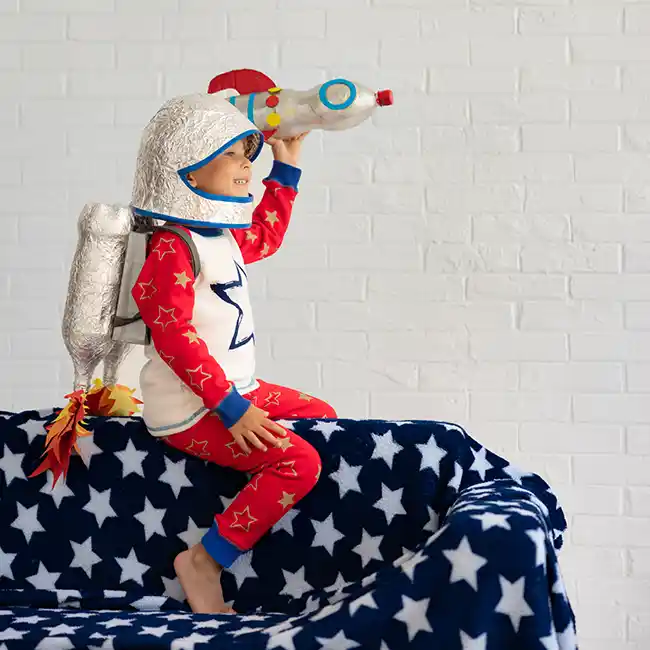FAQs About Pediatric OT
Read these frequently asked questions (FAQs) about pediatric occupational therapy (OT).
Pediatric Occupational Therapy
At Infinity and Beyond, our OT services help families:
- Relieve stress
- Improve relationships
- Foster greater independence
- Discover practical strategies to approach children with challenges
We do this by helping kiddos who struggle with everyday emotional, social, and/or physical activities. These challenges may result from an injury, illness, or innate (built-in) characteristics or challenges.
At Infinity and Beyond, we specialize in occupational therapy (OT) services for children with various challenges. Among other conditions, we help address the emotional, physical, and/or social needs of children with:
- Attention deficits disorder (ADD)
- Attention deficit hyperactivity disorder (ADHD)
- Autism spectrum disorder
- Behavioral and emotional challenges (such as outbursts, tantrums, or aggression)
- Brain injuries
- Cerebral palsy
- Developmental delays (physical, mental, social, and/or emotional) or missing developmental milestones
- Difficulties resting, sleeping, playing, learning, or being social
- Down syndrome
- Executive functioning challenges
- Motor planning disorders
- Developmental coordination disorders/delays
- Learning disabilities such as dyslexia/dysgraphia
- Genetic/Chromosomal disorders
- Delays related to pre-term birth
- Mental health challenges, such as anxiety, depression, or obsessive-compulsive disorder (OCD), oppositional defiance disorder (ODD)
- Academic challenges (especially those related to emotional or behavioral control, fine motor skills, visual motor skills, physical skills, or sensory issues)
- Sensory processing challenges (problems managing information related to sight, sound, taste, smell, or touch) and sensory processing disorder (SPD)
- Sensory modulation disorder (SMD), which is a subset of SPD (over-responding to, under-responding to, or craving sensations)
- Social and relational challenges
At Infinity and Beyond, we serve children and teens from birth to 18 years of age with pediatric OT services. And we support their families. We also can recommend a speech therapist.
At Infinity and Beyond, we apply a nearly infinite number of strategies that help children with everyday activities, such as developmental milestones, behavioral issues, social interactions, and more. We also integrate a fresh, groundbreaking approach called MNRI®.
Since we customize each child’s therapy, the OT interventions are too numerous to detail. However, the goals of OT are to help your child to:
- Become more independent in daily life skills (i.e., brushing teeth, dressing and feeding oneself, showering, playing with toys, and more)
- Improve social skills
- Strengthen fine motor skills, such as picking up food or utensils; using pencils, crayons, or scissors; playing with toys; buttoning, zipping, snapping, or tying shoes (i.e., coordinating vision and hand movement to point, reach, grasp, and & move objects)
- Advance sensory motor skills (such as balancing, crawling, walking, running, reaction time, and others)
- Enhance visual motor skills
- Regulate emotions and behaviors
The first OT session is typically an evaluation. An evaluation may take 60 to 90 minutes.
After that, each therapy session is 60 minutes. Additionally, seeing your child once or twice a week for therapy appointments is common.
We also provide elements to incorporate at home.

Payment for Occupational Therapy
“Medically Necessary” services are those for which:
- An occupational therapist must evaluate or treat a child.
- Progress and prognosis (positive outcome) of the child are likely.
- Occupational therapy is required to enhance abilities
Before your child starts treatment, we will verify the extent of your benefits. Then, during treatment, we will bill your insurance company for you.
Your child’s “functional activities” are day-to-day activities. Therefore, we look at those appropriate for your child’s age and for the next stage of development.
The state of Illinois covers all early intervention evaluations.
Additionally, our services are “in-network” for Blue Cross Blue Shield PPOs. Therefore, coverage with other carriers may vary.
Before you start treatment, we will verify the extent of your benefits. Then, during treatment, we will bill your insurance company for you. You will be responsible for any copays and the uncovered balance.
We offer a self-pay (private pay) option, too. Please call if you have any questions.
As mentioned previously, the State of Illinois pays for all early intervention evaluations.
All Kids Assist (formerly Kid Care) is Illinois’ federally funded insurance (Medicaid) for children. We currently do not take Medicaid clients.
Parent Testimonials
Miscellaneous Questions
An occupational therapist must hold a master’s degree. Additionally, Illinois requires licensure. For example, Occupational Therapist Stephanie Vogler holds a master’s degree and is an Illinois-licensed occupational therapist. She is also certified as an Early Intervention Provider and Evaluator and is credentialed as an MNRI® Core Specialist.